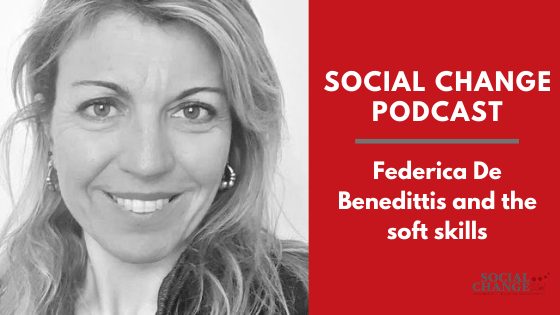Andrea: Good Morning and welcome to the new episode of the Social Change Podcast realized by the Social Change School in cooperation with Eduway social business.
We are ready to welcome to our podcast Federica De Benedittis, part of the Advisory Board of the Social Change School where she is also Head of Career Development, Founder of “The Good Skill”, professor at Roma 3 University in the Economics department, coach and formator cooperates as a consultant in “A Better Place” and in the third sector, she is also Head of fundraising and communication in Apurimac.
Federica De Benedittis: Good Morning I am happy to be here with you.
Andrea: Can you explain to us what a soft skill is?
Federica De Benedittis: The ones we currently call as soft skills, in the ancient times were called “virtues”, and were really important, considered as an essential element of those coordinating political life. Platoon talks about those virtues as the base of a society that grows and progresses.
Nowadays, these virtues have changed name but represent the same things as before, the soft skills are non-technical and are now considered secondary to those but are important.
Practically speaking, if we look at statistics, most non for-profit organizations (NFP)that actually survived in the pandemics are made of people able to adapt to change, fast to redefine plans with a strategic view, and flexible. These organizations survived the organizations that inspired and reorganized the team. Many of the things planned before the pandemics didn’t happen so only the flexible organizations that could use the new situation as a growing experience survived and thrived. The pandemic has been just one of the elements that showed the socio-economic situation, it is really important to talk about soft skills for these reasons.
As the philosopher Nassim Nicholas Taleb, says, in “The Black Swan” where the black swan is an unforeseeable event, “incertitude is part of our everyday life because the world we live in is complex made of many elements that work together and one part cannot work without the other”.
Ambiguity also reflects our historical moment, for this reason relational skills and compartmental competences are key in development.
Andrea: Can you also tell us other soft skills other than flexibility and adaptation that you think are relevant for the sector?
Federica De Benedittis: The soft skills are really important now for the third sector, that comprehends really different organizations that differ in size, strategy, processes, structure, financial capability… for these reasons the impact of the soft skills in each organization is different. In general in the NFP, the relationships with others are key in the development of projects and realization of impact, so we are already used to these skills.
There is a list of soft skills for the next 5 years, and it is created every two years by the World’s Economic Forum, based on academic studies and the needs of employers. The essential ones in the list are: complex problem solving, critical and analytical thinking, adverted derived innovation, decision making, team working (especially when it comes to international and complex ones), negotiation, emotional intelligence, resilience, these two last elements have a really good space for growth in the NFP sector, we could focus more on the application of competences in the team working, in the change processes internal to the organizations themselves other than just for projects.
A better attention to the needs of the operators of the sector, coordinators and managers need to be open to the needs of their HR respecting the structure of the organization.
Andrea: We said in your presentation a few words about “The Good Skill” project, can you tell us something more?
Federica De Benedittis: Sure, it is a group of professionals from the academic and the practical field, that studies and implements then the transversal competences, that we call “The GOOD skill” because with those we try to make some good and impact positively the world. And we are studying practical experiences, interviews and different evidences, that we re-elaborate and we propose to organizations.
From direct experience with organizations, I can say that the most important skills in the sector are three at the moment, other than the ones I already talked about before, especially when it comes to group work, but once we focus on leadership and managers. In “The Good Skill” we think that right now its fundamental to be responsible, and this can be scary, because usually we use it when talking about hierarchy, but this is not the sense we want to give to this word, for us it means to respond to someone and take possession of the action done responding to a need of the team of the organization itself, we take charge of solving in the best way some problem.
Andrea: We would like to know how to develop these skills during a career and also how to evaluate these skills, by NGOs?
Federica De Benedittis: these competences need to be practiced, one of the most important elements is to be aware that it is possible to develop them, and then it’s important to study and try. For these reasons I suggest, not only to project coordinators but to everyone working in the sector, to keep learning new skills, because in a sector like ours is key to developing proper projects. It is also important to evaluate these competences, recruiters consider these competences fundamental, since from a CV it is impossible to really understand them, we can just seem them listed there on a paper, like in a Cover Letter ( that it is important, because that is already showing what are the capabilities of the candidate), for these reasons human resources departments choose to subject candidates to simulations and role plays where the candidates can actually show their soft skills.
Andrea: Thank you for your participation and we wish you the best for your career
Federica De Benedittis: Thanks to you for this opportunity!


